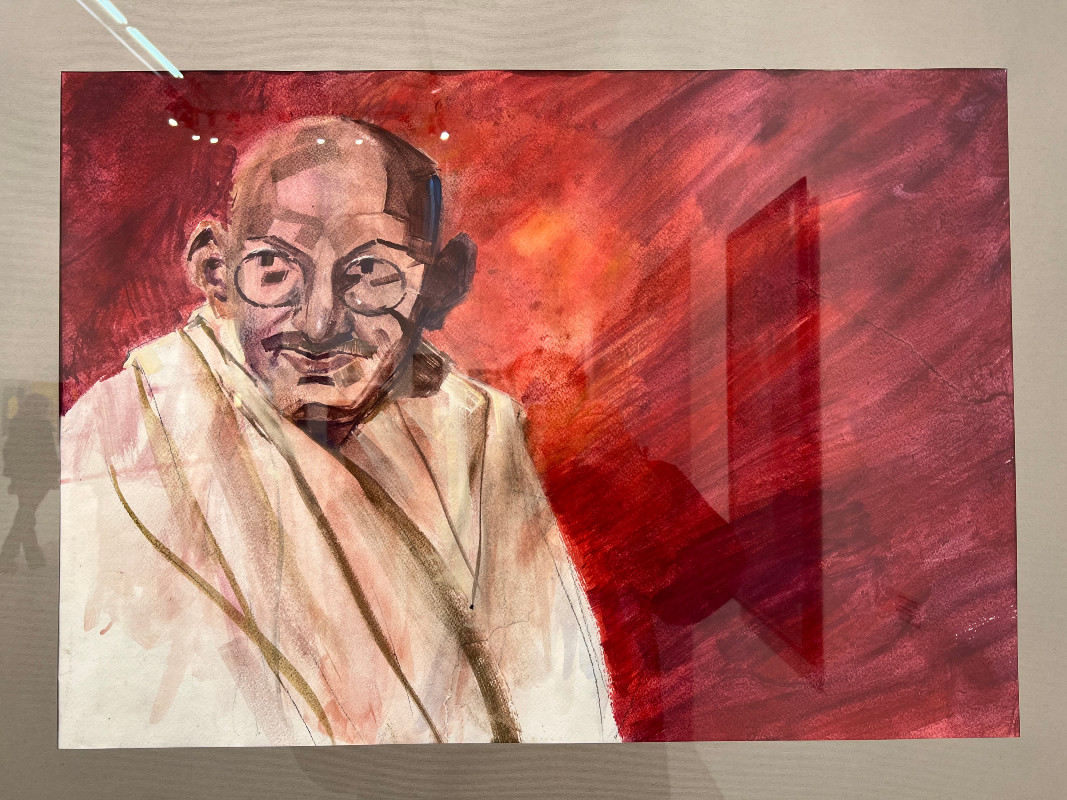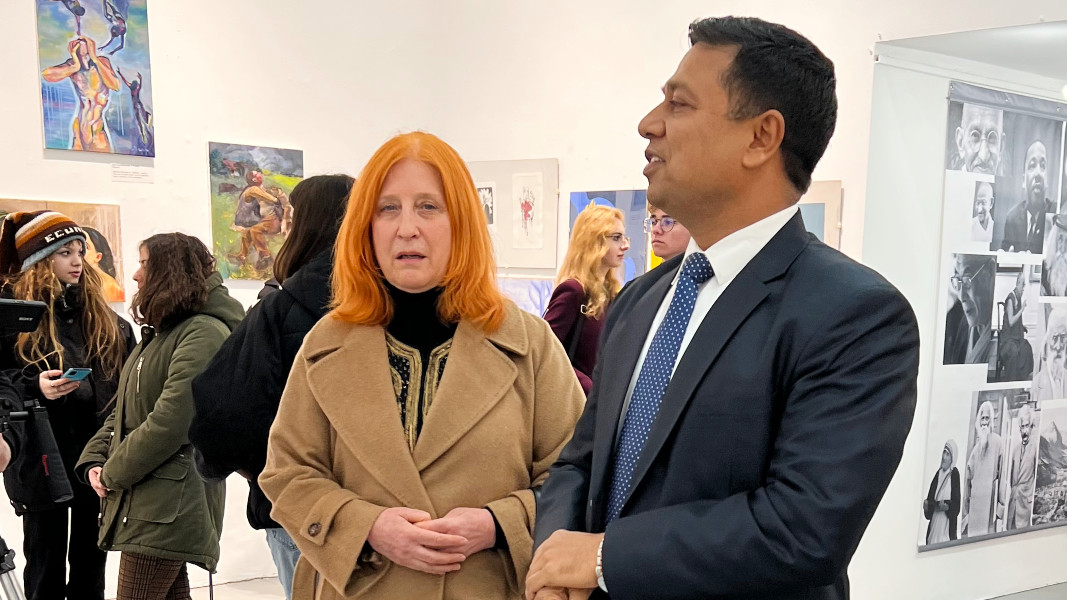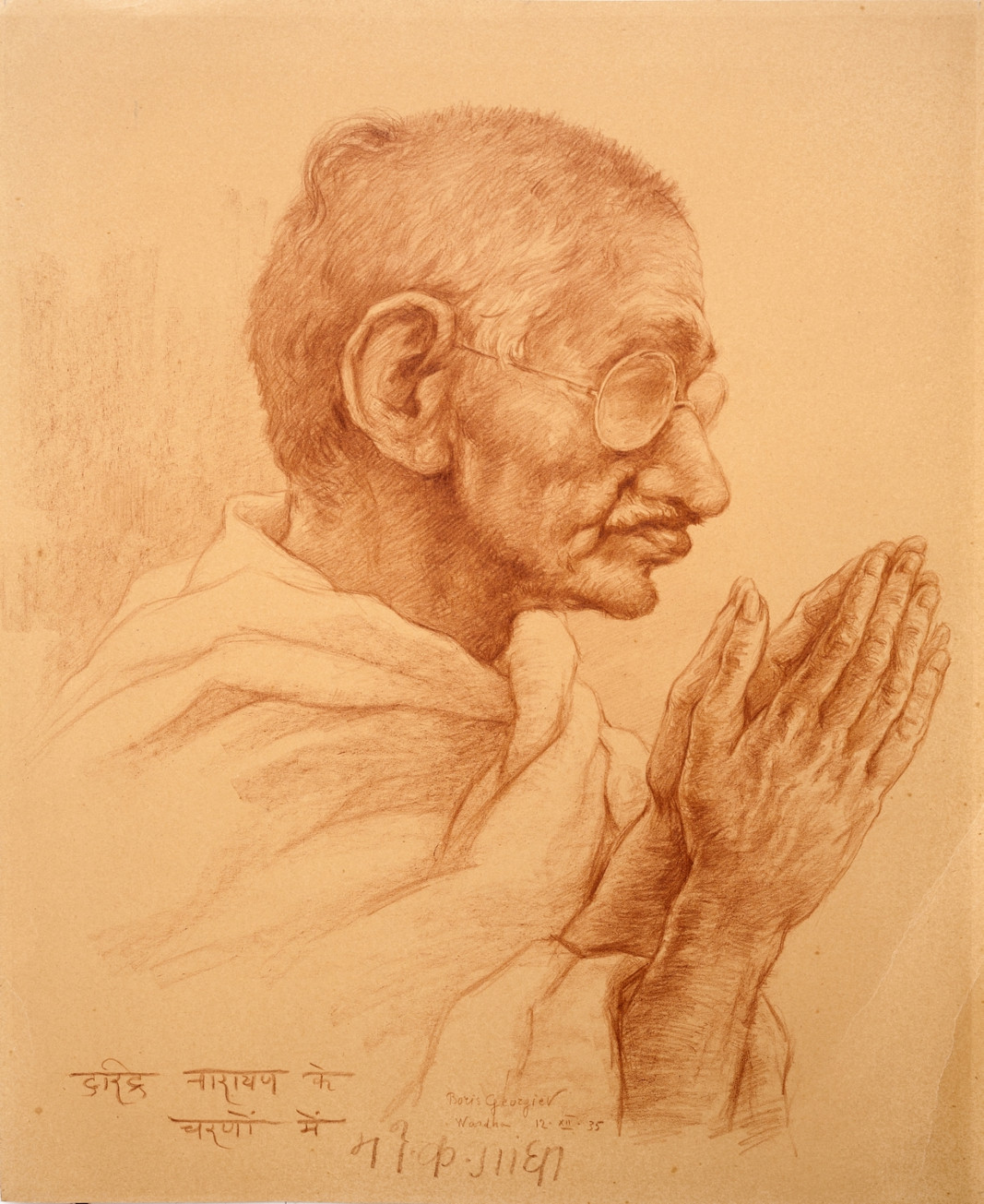Politics Without Principle, wealth without work, pleasure without conscience, knowledge without character, commerce without morality, science without humanity, religion without sacrifice - these are Seven Deadly Sins of our modern society according to world leader and 'Father of the (Indian) Nation' Mahatma Gandhi. Sins that are universal irrespective of religion, nationality or ethnicity. And like the great thinker's 'salt march', 35 artists are out on a march with their art towards a better world, an ahimsa world. The journey of the international exhibition "Ahimsa: Nonviolence", organized by the Union of Bulgarian Artists (UBA) and East-West Indological Foundation, with the support of the Embassy of the Republic of India in Bulgaria, began in October in the city of Pleven. Now its second, enriched edition showing works by some of the most prominent Bulgarian painters and sculptors and also works by their colleagues Nagji Patel (India), Ziyatin Nureyev (Turkey), Blagica Zdravkovska and Risto Stankovski (North Macedonia) is visiting the capital's Raiko Alexiev Gallery. Graduates of the Fine Arts profile of the National school of arts "Panayot Pipkov", Pleven, with teacher Ilian Angelov presented their creative interpretation of the theme.
The journey of the international exhibition "Ahimsa: Nonviolence", organized by the Union of Bulgarian Artists (UBA) and East-West Indological Foundation, with the support of the Embassy of the Republic of India in Bulgaria, began in October in the city of Pleven. Now its second, enriched edition showing works by some of the most prominent Bulgarian painters and sculptors and also works by their colleagues Nagji Patel (India), Ziyatin Nureyev (Turkey), Blagica Zdravkovska and Risto Stankovski (North Macedonia) is visiting the capital's Raiko Alexiev Gallery. Graduates of the Fine Arts profile of the National school of arts "Panayot Pipkov", Pleven, with teacher Ilian Angelov presented their creative interpretation of the theme.
The Ambassador of India to Bulgaria H.E. Sanjay Rana and his wife were special guests at the ceremony.
 “I am very happy when I see that this concept of non-violence that Mahatma Gandhi used in the Indian context has been developed all over the world, in different parts of the world in different fights against exploitation - for example, in the USA Martin Luther King brought up this idea, in South Africa Nelson Mandela brought up this idea, and here, at a time when there is a lot of violence in our society, we see this exhibition that brings together some of the best artists of Bulgaria to show how this concept is important for our society now, Ambassador Sanjay Rana told Radio Bulgaria. - It is not easy! Mahatma Gandhi never said it would be easy, in fact it is very difficult. But it takes strong people to make it happen. If we respond to violence with violence, it will only fuel a new fire. If we want to stop violence, we have to stop fuelling it. We must calm tensions everywhere. We must calm it internally, but also counsel others to be peaceful and calm.”
“I am very happy when I see that this concept of non-violence that Mahatma Gandhi used in the Indian context has been developed all over the world, in different parts of the world in different fights against exploitation - for example, in the USA Martin Luther King brought up this idea, in South Africa Nelson Mandela brought up this idea, and here, at a time when there is a lot of violence in our society, we see this exhibition that brings together some of the best artists of Bulgaria to show how this concept is important for our society now, Ambassador Sanjay Rana told Radio Bulgaria. - It is not easy! Mahatma Gandhi never said it would be easy, in fact it is very difficult. But it takes strong people to make it happen. If we respond to violence with violence, it will only fuel a new fire. If we want to stop violence, we have to stop fuelling it. We must calm tensions everywhere. We must calm it internally, but also counsel others to be peaceful and calm.” Curators of this travelling artistic march for non-violence are the two professors at the National Academy of Arts in Sofia, painter prof. Stanislav Pamukchiev and sculptor prof. Emil Popov.
Curators of this travelling artistic march for non-violence are the two professors at the National Academy of Arts in Sofia, painter prof. Stanislav Pamukchiev and sculptor prof. Emil Popov.

"Unfortunately, this great idea is proving to be extremely relevant nowadays. We are constantly subjected to aggression in this technological information time, Prof. Pamukchiev told Radio Bulgaria. - At one point the great work and philosophy of Gandhi and his followers and associates became the platform of this exhibition. It brings together 35 artists who share with us their creative discovery in the path of being open to good, to light. Through the frame of ahimsa, non-violence, their work can be read and understood one more time and this is a challenge to the viewer."
The exhibition features artists from different generations.

From famous artists like Pavel Koichev, prof. Valentin Startchev and Georgi Chapkanov through Ivaylo Mirchev, Stoyan Dechev, Milko Bozhkov to rising young talents like Martian Tabakov. The works were not created specifically for the project and represent the artists' long-standing views on non-violence.  One of the works is the validated stamp with the image of Gandhi, created by prof. Stoyan Dechev in 2019. Prof. Dr. Stanislav Pamukchiev is of the conviction that "Ahimsa: Nonviolence" is not just an exposition, but a collective act, an expression of the will in this world to realize nonviolence in the name of love and good.
One of the works is the validated stamp with the image of Gandhi, created by prof. Stoyan Dechev in 2019. Prof. Dr. Stanislav Pamukchiev is of the conviction that "Ahimsa: Nonviolence" is not just an exposition, but a collective act, an expression of the will in this world to realize nonviolence in the name of love and good.
There is a reason why we have brought so many artists together in one place, united around the creed of Mahatma Gandhi, says Yordanka Boyanova, chair of the East-West Indological Foundation.

"Generations of Bulgarian artists have lived and are living with the philosophical, ethical and existential values that were Gandhi's values. This thing brings them together, regardless of their culture, nationality and life path - Yordanka Boyanova says. You will see here, on the wall opposite the entrance to the gallery, a portrait of Mahatma Gandhi, by a Bulgarian - Boris Georgiev. It was extremely rare for someone to paint Gandhi in life because he led a very ascetic life and did not tolerate such vanity around him. But here is a Bulgarian who had the personal inner disposition to seek out such personalities and reach out to them. He was in India, in a very difficult environment, which is an indication of deep personal interest. That is why I say that there are many Bulgarian artists who are related to the great thinkers of the world and have made contact with them. And that's why it was not difficult for us to collect their finished works that overlap with the topic of non-violence, in the broadest sense of this concept - in thoughts, in feelings, in actions, in relations to others, in relation to oneself. In this exhibition I see the unity and the connection of Gandhi with Bulgarian art and the fact that we have such thinkers and artists makes me feel proud to be Bulgarian in the eyes of the whole world!"
The first EU Songbook has been released, featuring six songs from each of the 27 EU member countries and Ode to Joy, the anthem of the European Union, reports BTA. The Songbook, a non-profit Danish initiative, has no financial ties to the EU,..
Days of Bulgarian culture will be organized in Madrid between November 9 and December 31, 2024, BTA reported, citing Latinka Hinkova, president of the Association of Bulgarians and Artists "TREBOL" and head of two Bulgarian Sunday schools in Torrejon de..
The national awakeners of Bulgaria are the individuals for whom we feel not only gratitude and admiration, but also perceive as some of the most significant figures in our history, because they awaken our sense of national togetherness. However, what is..

+359 2 9336 661
